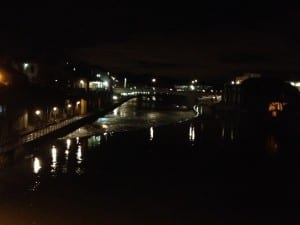University views of Durham Cathedral and Lincoln Cathedral
I belatedly saw the pun potential between conference title Life of i and my presentation calling for greater attention to digital i-mmigrants. I could have made more of that – or maybe not 🙁
Reflections from the past two days…
I’d have liked a copy of the Wordle of the presentation abstract texts where Learning was the largest word; I can’t remember the size of teaching. It’s essential to focus on how technology supports student learning but teacher engagement and education should be high on the agenda too.
MOOC made an appearance here and there, in passing, with no mention of Blackboardian ventures into open education e.g. the DIY CourseSites or CourseSites MOOC Catalogue. Keynote Patrick Carmichael compared MOOC with Thomas Hardy’s Jude. When ‘top’ universities provide material for free it’s like looking through a window on something you can’t be part of. Today we live in media rich, digital communication worlds and visually access more than ever – but often only on the surface as an observer. Interesting analogy but I’m not convinced. Keynote Robin Goodfellow said he thought MOOC never were a threat. I have to agree. MOOC were always more of an experiment; almost an inevitable evolutionary internet experience. Robin quoted recent research on MOOC retention rates. Disparities between initial enrolment figures and ongoing interaction appear to boost some MOOC bubbles whilst potentially creating new ones. I think one of the best thing about MOOC remains their snapshot into online learning design. Browsing around the MOOC platforms offer free examples of structuring resources and experiments with peer assessment. Anyone interested in the transfer of face to face practice to online environments should take advantage and get MOOCing while they can.
The ongoing emphasis on analytics intrigued me. Numbers always do. This is a shame considering my number dyslexia. Give me a Word document and I’m happy. Send me a spreadsheet and I break out in a cold sweat. Tracking and statistics represent increased quantification of learning – making education a measurable commodity, never easy with creativity and higher order skills of critical thinking and reflective practice. There’s the sense of applying a ‘one size fits all’ model to what is essentially a unique experience. This also risks misinterpretation of perceived engagement and fails to explain resistance.
I was intrigued by ‘busy-ness’ of the conference environment. Lincoln can’t be the only university with differences of opinion over the use of mobile technology in lectures and seminars, but in a conference it’s ok for the audience to be multitasking. Presenters speak over a click clack clatter of laptop keys while sitting at the back gives a clear view of the range of email, twitter, facebook and report writing activities going on. Feels uncomfortable, a bit like virtual stalking, but impossible not to do. It’s symptomatic of how ICT are changing the way we work, rest and play – although the issue of students and their use of mobile technology in lectures and seminars – from the point of view of staff who teach and support learning – remains unresolved.
This was my first Blackboard Users event. I wasn’t sure who the audience would be. A delegate list would have been useful to see how many attendees were teachers rather than technologists and if there were any students there. The conference reinforced a sense of layers. The closest relationship between the technology and the technologists, then the technology advisers (known by many names), administrators, students and others with teachers last. Do we need to turn this round? With Embedding OER Practice at Lincoln, having those who supported the technology on the same teams as those who used it for teaching led to useful insights. As with all project funding, it came to an end. We planned for sustainability but motivation and enthusiasm inevitably diluted. I’ve come back from Durham convinced we need to revisit the principles of the OER project, and do more to develop, build and cross new bridges between those who manage the technology and those who use it for teaching – or not…
Durham at night





Comments are closed.